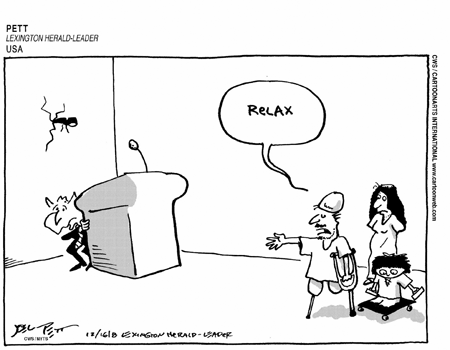Saturday, January 03, 2009
NYT: Suicide Attack Kills 24 at Iraqi Tribal Gathering


Insurgents still have influence in some districts in Yusufiya.
Suicide Attack Kills 24 at Iraqi Tribal Gathering
BAGHDAD — At least 24 tribal leaders who were meeting at the house of an influential Sunni sheik to discuss national reconciliation efforts were killed and as many as 42 others were wounded Friday after a member of the tribe detonated an explosive vest among the guests, government officials said.
Reports of fatalities among the approximately 1,000 members of the Qaraghul tribe gathered for the meeting have ranged as high as 30 killed and 110 wounded, but those numbers could not be confirmed by Friday evening.
The bombing occurred in the town of Yusufiya, about 25 miles southwest of Baghdad in an area once referred to as the Triangle of Death because it had been one of the centers of the insurgency against American forces in Iraq. It is a region where Al Qaeda in Mesopotamia, a homegrown Sunni extremist group that American intelligence agencies say is led by foreigners, has been active.
During the past year and a half, however, violence in Yusufiya had been tempered after local tribal leaders turned against the insurgents and began to support the American military and the Iraqi government.
Yet, some of the town's neighborhoods have never won complete freedom from Qaeda operatives, who have sought to lure tribal members back to the insurgency with gifts of money and cars, a local sheik said.
Friday's bombing occurred during a lunch meeting at the Yusufiya home of the tribal leader, Mohammed Abdullah Salih al-Qaraghuli, for nearly 1,000 members of the Qaraghul tribe, who had traveled from around Iraq to be there, guests said. The tribe includes Sunnis, Shiites and Kurds.
Some of those in attendance were former Sunni insurgents who had become leaders of Awakening Councils, groups allied with the government against Al Qaeda.
After Friday Prayer, the tribe ate a communal lunch in a large yard adjacent to the sheik's house to discuss which 20 members would represent them at a meeting with the Iraqi prime minister, Nuri Kamal al-Maliki.
Relations have been tense between many of the predominately Sunni Awakening Councils and the Shiite government of Mr. Maliki, most notably with regard to the number of Awakening Council members who will be hired for the national police and army, and whether former insurgents will be prosecuted for previous crimes.
Around 1:30 p.m., after lunch, some of the tribal leaders lingered, drinking tea, while others began to leave, said several guests, who would speak only on condition of anonymity because of fear of retaliation.
It was about then that one of the tribe's members, Amin Ahmed Edan Hasoon, who is well known in the neighborhood, entered the yard without being searched by guards, guests said. Moments later, he detonated an explosive vest he was wearing.
"I heard a horrible and shocking explosion, and there were people who had been standing in the yard and suddenly, no one was standing — they were on the ground," said Abu Khalid, 33, a teacher and tribal leader who had gone to wash his hands when the bomb went off.
At Yarmouk Hospital in Baghdad, where many of the wounded were taken, the sound of sobbing men and women filled the corridors.
Khalid Abdullah Salih al-Qaraghuli, a brother of the sheik who hosted the gathering, was lying in a hospital bed awaiting care. Shrapnel had pierced his left side, his left arm and his left leg. "I was standing, saying goodbye when the blast happened," he said. "I was blown 15 meters away."
The sheik suffered only minor injuries, his brother said.
Another guest, Mohammed Dawood Hussein, said he remembered almost nothing. "I heard an explosion and I immediately lost consciousness and found myself in the hospital," he said.
Also Friday, armed men fatally shot three members of an Awakening Council at a security checkpoint in Jurf al-Sakher, a town near Hilla, about 60 miles south of Baghdad. Six other Awakening members were wounded.
Reporting was contributed by Suadad al-Salhy, Campbell Robertson, Mohammed Hussein and Sam Dagher in Baghdad, and by Iraqi employees of The New York Times in Baghdad and Hilla.